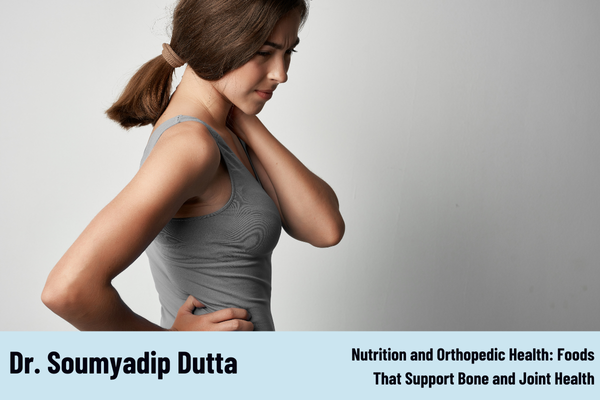Maintaining healthy bones and joints is essential for overall mobility and quality of life. Orthopedic health isn’t just about treatments and surgeries; proper nutrition plays a vital role in keeping bones strong and joints flexible. Dr. Soumyadip Dutta, one of Kolkata’s leading orthopedic surgeons, highlights how specific foods can contribute to bone and joint health.
The Role of Nutrition in Orthopedic Health
Our bones and joints require key nutrients to stay strong, function smoothly, and resist wear and tear as we age. While calcium is well-known for its bone benefits, several other nutrients play an essential role in orthopedic health.
Top Nutrients for Bone and Joint Health
- Calcium Calcium is the building block of bones. It helps maintain bone mass and strength, preventing conditions like osteoporosis. Dairy products like milk, cheese, and yogurt are great sources of calcium. For those who are lactose intolerant, leafy greens, almonds, and fortified plant-based milks are excellent alternatives.
- Vitamin D Vitamin D helps your body absorb calcium. Without sufficient vitamin D, bones can become brittle and weak. The best natural source is sunlight, but you can also find vitamin D in fatty fish (like salmon and tuna), fortified cereals, and egg yolks.
- Protein Protein is vital for muscle health, which supports joints and prevents strain on bones. Lean meats, poultry, fish, and legumes are rich in protein. Maintaining muscle mass is crucial, especially as we age, to reduce the risk of fractures and joint problems.
- Omega-3 Fatty Acids Omega-3s help reduce inflammation in joints and prevent cartilage degradation, which is critical for individuals with arthritis or joint pain. Foods rich in omega-3s include salmon, mackerel, chia seeds, flaxseeds, and walnuts.
- Vitamin K Vitamin K plays a role in bone metabolism and aids in the binding of calcium to bones. Leafy greens such as spinach, kale, and broccoli are excellent sources of vitamin K.
- Magnesium Magnesium helps with bone structure and strength, and it also plays a role in maintaining joint flexibility. Nuts, seeds, whole grains, and dark leafy greens are rich in magnesium.
- Collagen-Boosting Foods Collagen is a protein that helps in maintaining joint elasticity and cartilage health. Foods rich in vitamin C like oranges, strawberries, and bell peppers can aid collagen production.
Foods to Avoid for Joint Health
Certain foods can exacerbate inflammation and weaken bone health:
- Sugary drinks and processed foods can increase inflammation.
- Excessive salt intake can cause calcium loss.
- Alcohol may interfere with vitamin D metabolism, reducing calcium absorption.
Conclusion
A balanced diet packed with these essential nutrients is key to maintaining strong bones and healthy joints. By incorporating these foods into your daily meals, you can reduce your risk of orthopedic issues as you age. Dr. Soumyadip Dutta, a leading orthopedic surgeon in Kolkata, recommends pairing good nutrition with regular physical activity to ensure optimal bone and joint health.
For personalized orthopedic care and expert advice, consult Dr. Soumyadip Dutta today.

